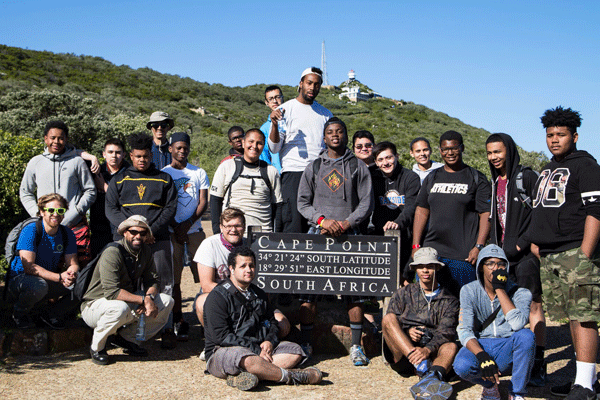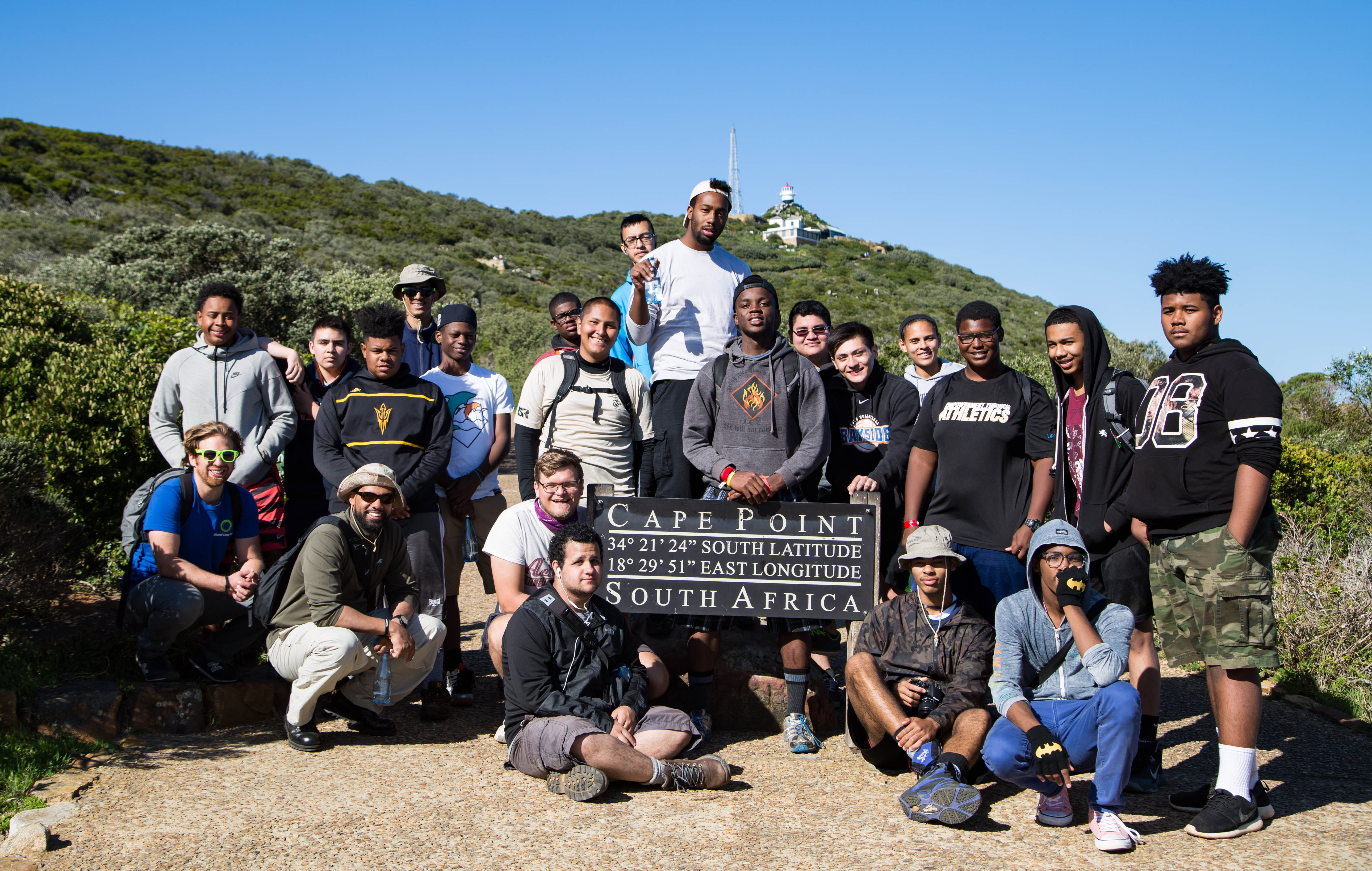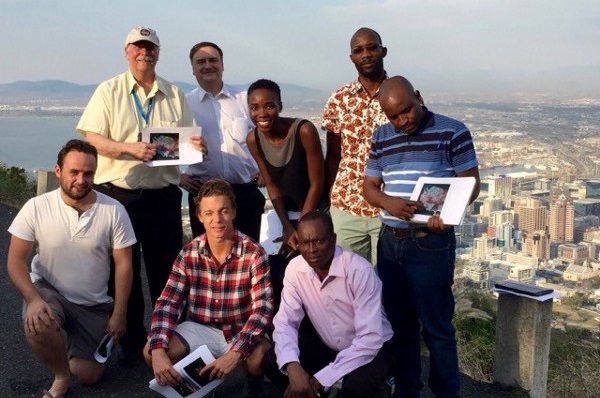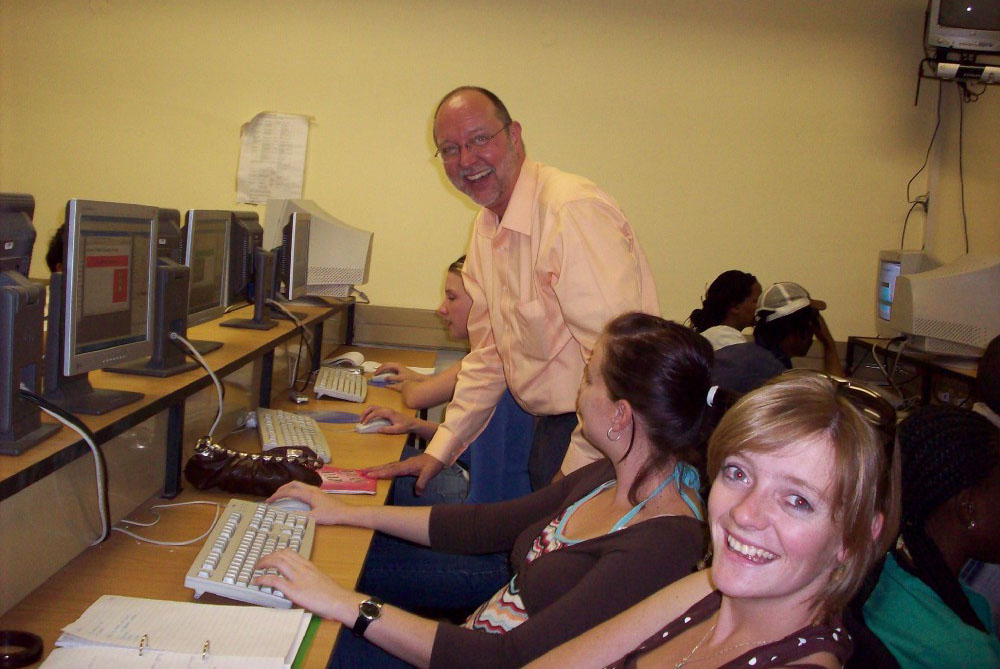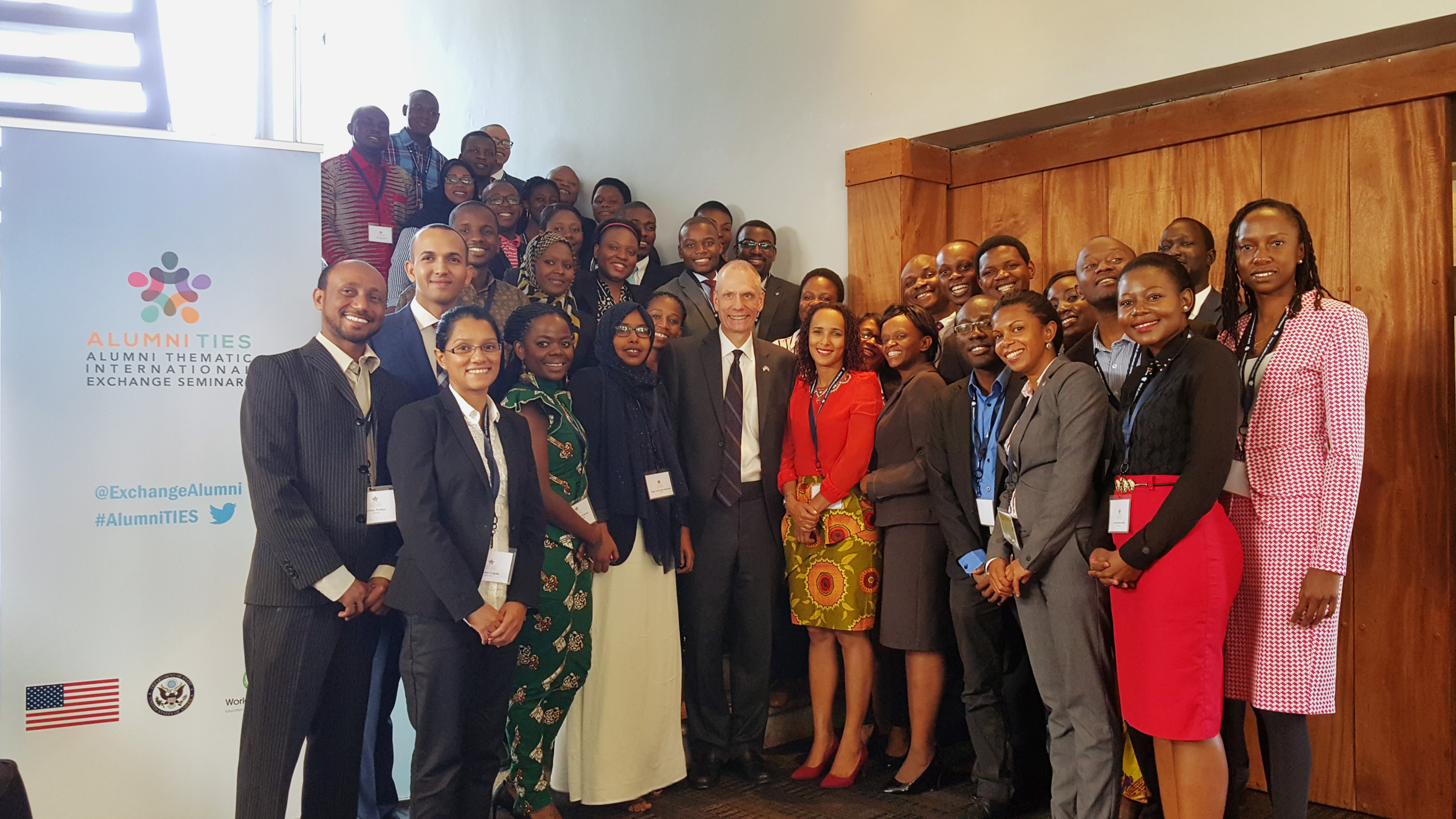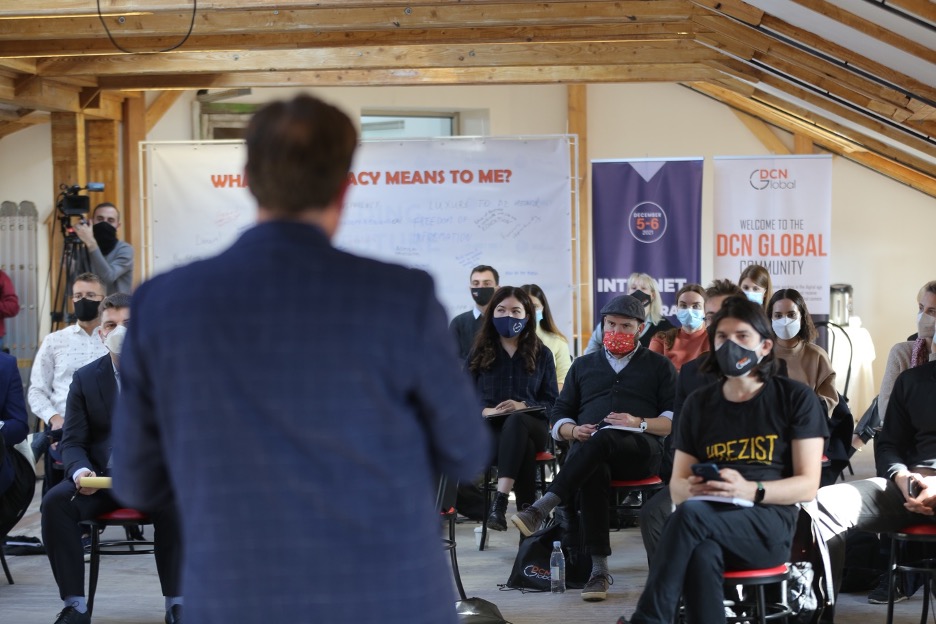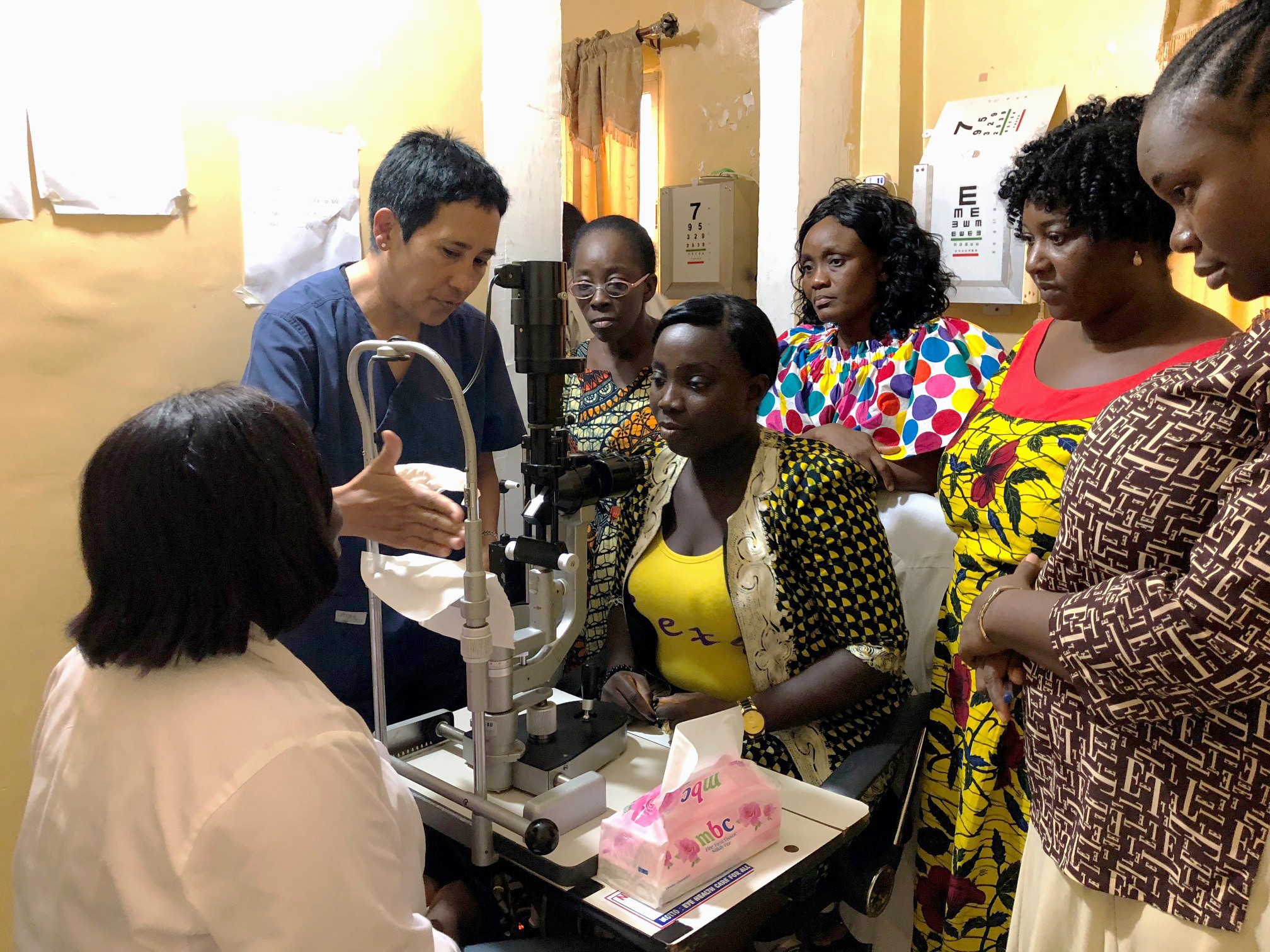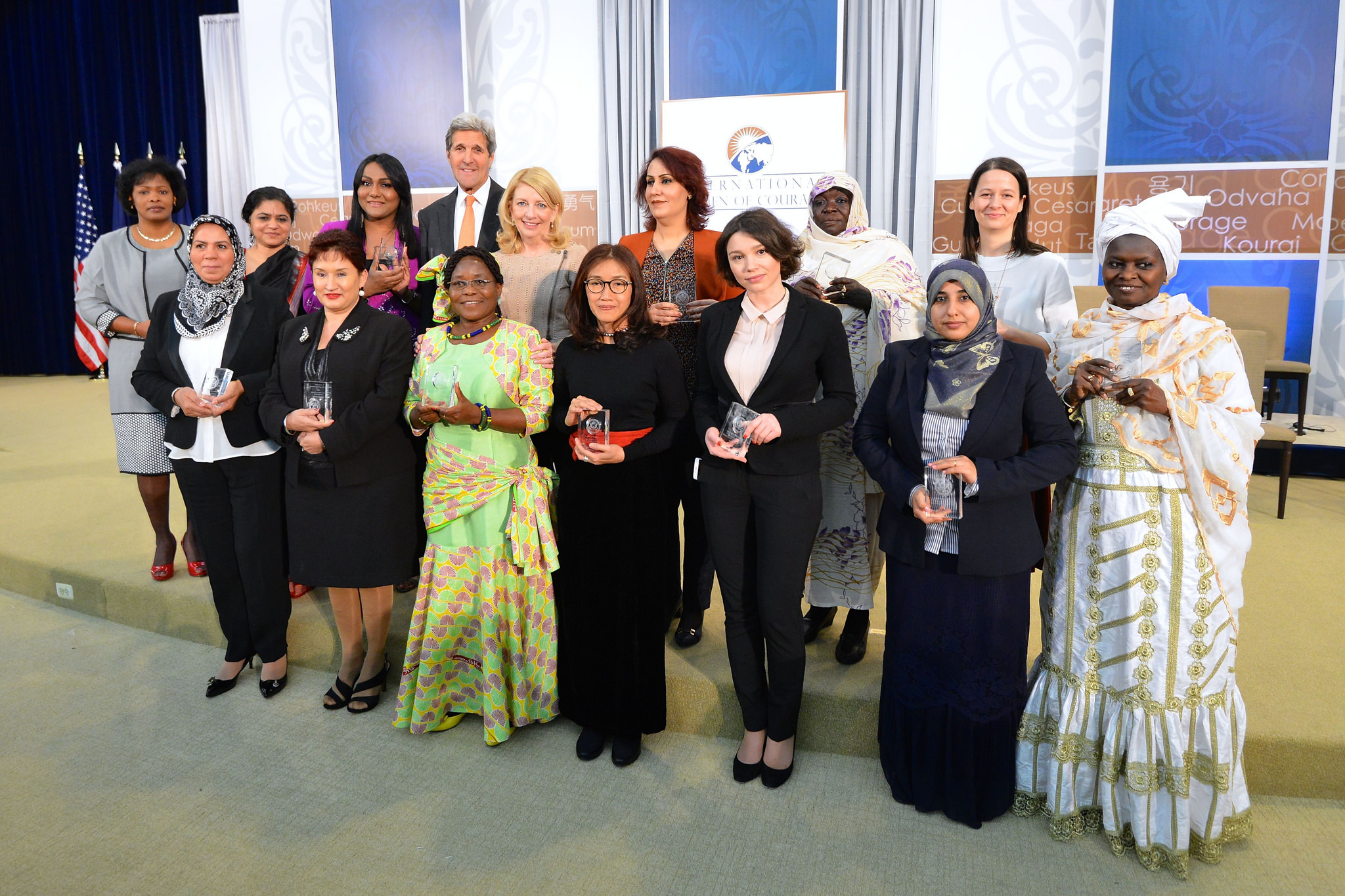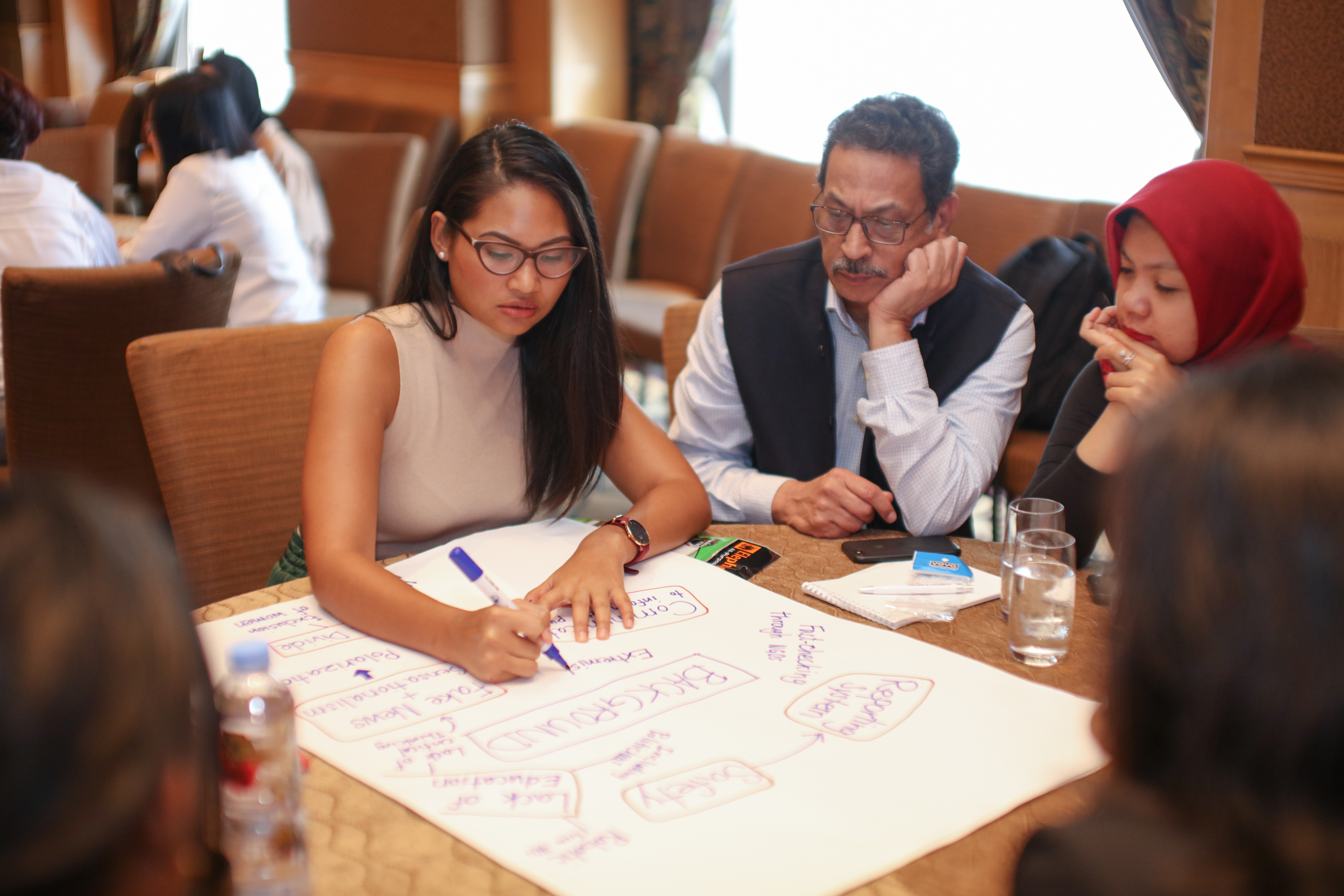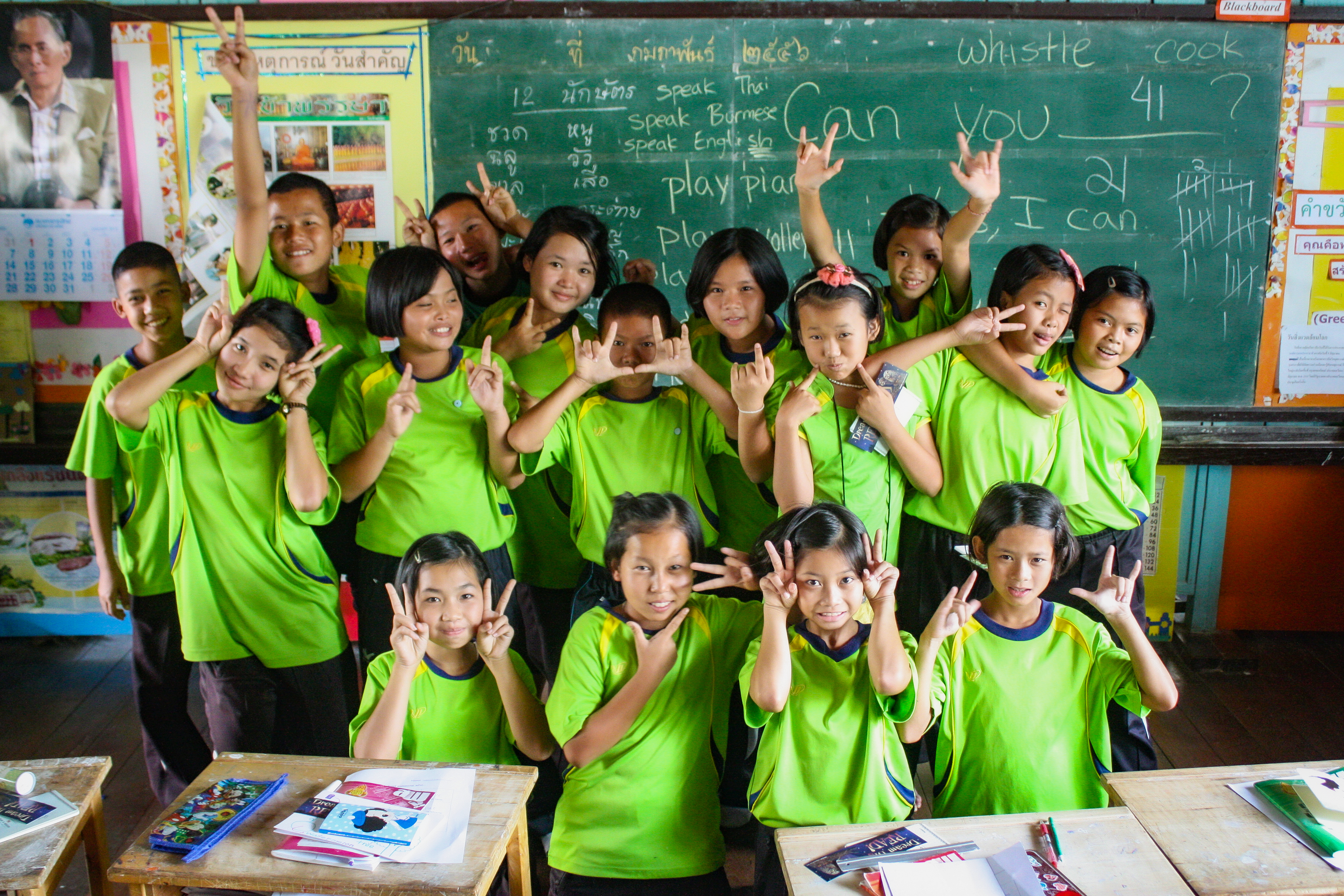-
What We Do
- WHERE WE WORK
-
About Us
 Welcome Message from Carol Jenkins
Welcome Message from Carol JenkinsFor more than 90 years, World Learning has equipped individuals and institutions to address the world’s most pressing problems. We believe that, working together with our partners, we can change this world for the better.
On my travels, I’ve had the opportunity to meet with many of those who have joined us in this mission. In Baghdad, we’ve trained more than 2,300 Iraqi youth who are already giving back at home. In London, our partners in the TAAP Initiative strongly believe that we are all responsible to practice inclusion. And in Vermont, our Experiment in International Living and School for International Training participants prove every day that they have the tools and the determination to change the world.
Please join us in our pursuit of a more peaceful and just world.
- Get Involved
Country: South Africa
The Fellowship Initiative Is Shattering the Status Quo
The Fellowship Initiative
Using Space Technology to Manage Disasters in South Africa
Scott Madry trains people to use technology more often associated with space exploration than earthly problems like natural disasters, climate change and urban planning. But the Executive Director of the Global Space Institute and former NASA researcher explains that satellites and graphical information systems (GIS) are important tools for researchers across many disciplines working on a myriad of issues that affect people across the globe.
He was awarded a Fulbright Specialist grant to South Africa to share his technical expertise and passion for mapping and analysis with graduate students and faculty at the University of Cape Town’s (UCT) SpaceLab, which promotes interdisciplinary education and research in space science and technology.
The goal is to help students learn how to use Open Source geospatial tools for high tech applications of mapping, satellite imagery, and global positioning systems for a variety of purposes, including disaster management, Madry’s specialty. His work is key in a region like southern Africa, which lacks infrastructure and access to geospatial tools.
“There is great commercial software, but it’s incredibly expensive,” explains Madry, who is also a professor at the University of North Carolina at Chapel Hill (UNC).
“A lot of people who could benefit from using these tools don’t because of the cost. There are comparable toolkits in the Open Source community. I’m trying to kickstart their ability to use these tools for a wide variety of uses including public health, agriculture, and disaster management.”
A highly sought-after expert in the field, Madry received the President’s Volunteer Service Award from former President Barack Obama for his work on providing disaster assistance using space technology.
As a Fulbright Specialist in Cape Town this past April, he trained graduate students from five countries: South Africa, Nigeria, Botswana, Spain and the Netherlands. He also collaborated with UCT faculty to create the necessary framework to teach other students how to use the free toolkit.
“I’m setting up the SpaceLab to have its own capability to continue the training. Eventually they’re not going to need me anymore. My being able to come as a Fulbright Specialist is a key component of this,” he says.
His Fulbright Specialist grant benefits a large emerging country like South Africa, facing environmental and economic challenges, by providing training to use free Open Source tools to map fires, floods, and deforestation quickly. The ability to analyze integrated data can help decision-makers understand what’s happening around the country and therefore respond more effectively.
“We can go on the ground with GPS and identify specific locations and put it in GIS to combine different information: satellite images, public health data, and crime locations, and integrate this data to understand relationships in order to more intelligently address complex environmental and social human problems,” says Madry.
Madry credits his academic background in anthropology and archaeology, rather than science, technology, engineering or math (STEM), for his work’s focus on human societies and their relationship to their environments. Following the launch of commercial satellites, he took satellite and electrical engineering courses and adapted this technology for new applications.
“I come at it from a different perspective, and that’s what I try to give my students in my home institution and in South Africa as a Fulbright Specialist. We can’t just look at engineering, data, or computer science. It’s about people and the world we live in,” he adds.
His Fulbright Specialist grant is for a multi-visit project, which fits well with the schedules of Madry and the graduate students, many of whom work concurrently for NGOs, government agencies, and the private sector and are not always in residence. He will return to South Africa in 2018 after students have had an opportunity to practice using the toolkit on their own.
In the meantime, he’s sharing experiences and lessons from Cape Town with his students and colleagues at UNC.
“The work in South Africa is bringing home — quite literally — to my students, colleagues, and projects a sense of connection and immediacy with our local community and local needs,” he pointed out as he headed off for a two-week deployment with the American Red Cross as part of a disaster assistance team responding to Hurricane Irma.
“I have great hope that things can improve because of the kind of work we are doing,” Madry says. “Ultimately, we’re sowing seeds to make a positive impact.”
Furthering the Use of New Media in Africa
When Gary Kebbel was awarded a Fulbright Specialist grant in 2007 to help a university journalism department in Pretoria, South Africa advance its digital media curriculum, he never imagined it would change the focus of his career. But one encounter at Tshwane University of Technology in Soshanguve, a resource-poor satellite campus in Gauteng, about 25-miles outside the city, gave him a glimpse into the future of media.
“I was teaching the students how to blog and about blogging software,” recalls Kebbel. “Everyone was excited except one kid who wasn’t paying attention. He was looking down and pushing buttons on his flip phone. I asked him what was up.”
The student replied he was doing his banking.
“A kid in the middle of the boonies in South Africa doing his banking via SMS. It suddenly struck me — the future of the world is mobile and the U.S. is behind,” he says.
“It changed the entire direction of my career,” Kebbel adds.
Since then, he’s produced two national conferences called MobileMe&You, designed to advance new initiatives and innovations in newsgathering, storytelling and distribution using mobile media.
Kebbel was well placed to be at the forefront of new media. During his time as program director at the John S. and James L. Knight Foundation in Miami, Florida, from 2006–2010, he helped create and run the Knight News Challenge, a $25 million contest to find digital news innovations to be used to improve digital communication and community engagement.
“I spent four years talking to people at the cutting edge about what worked and what didn’t work,” Kebbel says about the contest.
He also helped create the Knight Citizen News Network and the Knight Digital Media Center.
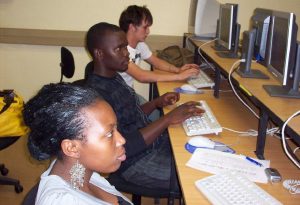 The Fulbright Specialist Program was established in 2001 to connect U.S scholars and professionals with their counterparts at host institutions overseas for short-term collaborative projects.
The Fulbright Specialist Program was established in 2001 to connect U.S scholars and professionals with their counterparts at host institutions overseas for short-term collaborative projects.
As Kebbel says, “I could have never gotten off for a semester. This was a game-changer.”
Following the Knight Foundation, Kebbel served as dean of the College of Journalism and Mass Communications at the University of Nebraska-Lincoln and during his tenure from July 2010 to June 2012 his college created the nation’s first Drone Journalism Lab. He left that post to work on creating the university’s Center for Mobile Media.
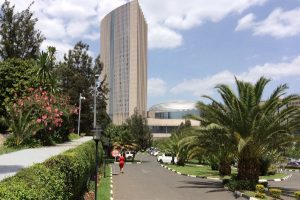 He received another Fulbright Specialist grant in 2014, this time working with the U.S. Mission to the African Union (AU), a cooperative organization made up of 54 African nations. He advised the AU’s Communications Directorate in Addis Ababa, Ethiopia, on a strategy to incorporate social media into crisis communications.
He received another Fulbright Specialist grant in 2014, this time working with the U.S. Mission to the African Union (AU), a cooperative organization made up of 54 African nations. He advised the AU’s Communications Directorate in Addis Ababa, Ethiopia, on a strategy to incorporate social media into crisis communications.
“I like the idea of mobile media for developing countries. They are leap-frogging developed countries in this area,” he says.
“Anybody not focusing on mobile media is truly doing so at his or her peril,” he adds.
The power of mobile media — which he’s seen first-hand in Africa as a consultant for the U.S. Department of State in regards to elections in Kenya in 2012 and Nigeria in 2014 — is the way it’s changing power structures.
“By its very nature, mobile media takes power away from power structures and gives it to the people,” observes Kebbel, who also did stints in Tunisia, Taiwan and Russia as a U.S. Department of State trainer.
Kebbel was named a national peer reviewer of Fulbright applications for the Specialist Program, serving one year from spring 2015 -2016.
He has also worked with the Foreign Service Institute in Washington, D.C training public affairs officers.
A veteran newsman, Kebbel served as a founding editor of USATODAY.com and Newsweek.com, the home page editor of the Washingtonpost.com and news director at AOL. These days, however, he sees the growth of media through the lens of his Fulbright Specialist experience.
And for that reason he says, “I would encourage other people to do it,” referring to the program, because “doing this kind of work helps you understand other people. Academics pass that learning along to their students.”
The Fulbright Specialist Program was established in 2001 by the U.S. Department of State and the Bureau of Educational and Cultural Affairs (ECA) to enable U.S. professionals and scholars to work on short-term projects overseas in conjunction with local host institutions.
For more information about the Fulbright Specialist Program or to apply, please go to: https://fulbrightspecialist.worldlearning.org/the-fulbright-specialist-program/
The Experiment in International Living with The Fellowship Initiative on KFI AM
Alumni Thematic International Exchange Seminars
Participant Profile
Participants are alumni of U.S. government-sponsored exchange programs and vary in age and level of expertise, but all will be engaged in the seminar topic and highly motivated to create change in their communities.
Please consult the list of U.S. government-sponsored exchange programs below.
- U.S. citizen: https://exchanges.state.gov/us
- Non-U.S. citizen: https://exchanges.state.gov/non-us
Participant Selection
Alumni TIES participants who are not U.S. citizens are nominated by the U.S. Embassies or Consulates in their countries. Please contact the U.S. Embassy or Consulate in your country to learn how you can participate in Alumni TIES. Potential Alumni TIES participants who are living in the United States can apply for specific seminars managed by World Learning. The web link to the online application will be distributed widely by the Office of Alumni Affairs of the Bureau of Educational and Cultural Affairs.
All participants for Alumni TIES seminars are selected by the U.S. Department of State.
Program Design
Alumni TIES seminars take place in six world regions and the U.S.; each seminar is three to four days for small groups of alumni. The seminars include speakers, capacity development trainings, and alumni networking activities. Through the small grants initiative, alumni have the opportunity to take action and make a positive difference in their communities.
Learn More
Watch more videos about the Alumni TIES program.
Read stories from past participants about their experiences at the seminars or with their small grant projects on the Alumni TIES blog.
For information on programs for U.S. government-sponsored exchange program alumni visit the International Exchange Alumni website.
Alumni TIES is sponsored by the U.S. Department of State with funding provided by the U.S. Government and supported in its implementation by World Learning, in partnership with the Office of Alumni Affairs of the Bureau of Educational and Cultural Affairs (ECA).
Digital Communication Network
Examples of Past Digital Communication Network Projects
- Internet vs. Democracy Forum
- Roaring 20s #Digital Forum
- Combatting Disinformation Training Program
- Digital and Media Literacy for NGOs Training Program
- Tolerance and Coexistence 2.0 Forum
- Montenegro Digital Influencers Hub
- Humor and Games for Social Good Forum
Fulbright Specialist Program
What?
Link U.S. Experts and International Institutions
A program of the U.S. Department of State, Bureau of Educational and Cultural Affairs, the Fulbright Specialist Program is a unique opportunity for U.S. academics and established professionals to engage in two- to six-week consultancies at host institutions across the globe. Host institutions, including universities, non-profits, and other organizations, develop and submit projects for approval by the U.S. Embassy or Fulbright Commission in their country in wide-ranging academic and professional fields that build capacity and promote long-lasting linkages between individuals and institutions in the U.S. and abroad.
Why?
Address Priorities and Build Institutional Capacity at Institutions Around the World
An important companion to the traditional Fulbright Scholar Program, the Fulbright Specialist Program differs by providing short-term exchange experiences that tackle discrete, sometimes rapid response, projects. The Fulbright Specialist Program encourages participation of both university faculty and highly experienced non-academics, including legal experts, business professionals, public health practitioners, scientists, IT professionals, artists, and journalists. The program is a mutually beneficial opportunity for the Specialist who may not be available to leave their position for an extended period of time and the host institution which needs an experienced partner to jointly tackle a problem or examine an issue on a short-term basis.
How?
Become a Fulbright Specialist: Apply to Join the Roster
Fulbright Specialists are a diverse group of highly experienced, well-established faculty members and professionals who represent a wide variety of academic disciplines and professions. In order to be eligible to serve as a Fulbright Specialist, candidates must have significant experience in their respective professional field and be a U.S. citizen at time of application. Eligible disciplines and professional fields supported by the Fulbright Specialist Program are listed below.
- Agriculture
- American Studies
- Anthropology
- Archeology
- Biology Education
- Business Administration
- Chemistry Education
- Communications and Journalism
- Computer Science and Information Technology
- Economics
- Education
- Engineering Education
- Environmental Science
- Law
- Library Science
- Math Education
- Peace and Conflict Resolution Studies
- Physics Education
- Political Science
- Public Administration
- Public/Global Health
- Social Work
- Sociology
- Urban Planning
Interested candidates can find more information about the Fulbright Specialist Program and apply to serve as a Specialist at fulbrightspecialist.worldlearning.org. Candidates who meet all eligibility requirements will have their full applications reviewed by a panel of their professional peers. Candidates who are approved by the peer review panels will then join the Fulbright Specialist Roster. Individuals remain on the Specialist Roster for a three-year term and are eligible to be matched with a host institution’s project abroad during that tenure.
The following costs are covered for those Fulbright Specialists who are matched to a project: international and domestic airfare, ground transportation, visa fees, lodging, meals, and incidentals. A daily honorarium is also provided.
Become a Host: Bring a Fulbright Specialist to Your Institution
The Fulbright Specialist Program allows universities, cultural centers, non-governmental organizations, and other institutions abroad to host a leading U.S. academic or professional to work on diverse, short-term collaborative projects where the Specialist conducts activities which may include, but are not limited to:
- Delivering a seminar or workshop
- Consulting on faculty or workforce development
- Developing academic or training curricula and materials
- Lecturing at the graduate or undergraduate level
- Conducting needs assessments or evaluations for a program or institution
Institutions interested in hosting a Fulbright Specialist should contact their local Fulbright Commission or U.S. Embassy for country-specific requirements and deadlines.
Contact information for all participating countries is available on the fulbrightspecialist.worldlearning.org website.
For more information or questions about the Fulbright Specialist Program, please email [email protected].
The Fulbright Specialist Program is a program of the U.S. Department of State with funding provided by the U.S. government and administered by World Learning.
The Experiment and TFI Journey to South Africa
The Experiment Leadership Institute: D.C. Orientation Week 2016
International Visitor Leadership Program
End of Year Report
Chosen by U.S. embassies worldwide to participate, distinguished professionals include:
- parliamentarians
- government officials
- entrepreneurs
- NGO leaders
- journalists
- academics
- arts administrators
- mid-career professionals
Programs focus on policy issues in areas such as:
- government
- international security
- foreign policy
- entrepreneurship
- economics and trade
- media
- women’s leadership
- education
- public health
- arts
- agriculture
- disability rights and inclusion
World Learning staff members design national itineraries, arrange logistics, set up meetings in Washington, DC, and coordinate the collaboration of U.S. Department of State program officers, interpreters and International Visitor Liaisons, and more than 85 community-based member organizations from the Global Ties U.S. Network who arrange local programs nationwide.
Participants
Most participants are mid-career professionals and emerging leaders, and for many, this is their first visit to the U.S. Groups are of varying sizes, from single visitors to groups of 25 or more. World Learning program staff work closely with their State Department counterparts to design a program customized to the project objectives and the visitors’ interests.
Participant Selection
IVLP candidates are selected solely by U.S. embassy personnel in each country. There is no application form. World Learning is a private sector partner of the U.S. Department of State; our role is limited to designing programs for participants once they arrive in the U.S. For further information regarding the program, please consult the U.S. Department of State’s website.
Program Design
A typical project includes up to a week of meetings in Washington, DC, to provide an orientation and overview of the theme and to introduce visitors to federal officials and agencies, national organizations, academics and think tanks, nonprofits and NGOs, and professionals in their specific field of interest. All projects include a briefing on the US federal system of government. Meetings may include panel discussions, site visits, workshops, individual interlocutors, job shadowing, or service opportunities. Visitors typically travel to an additional three or four cities in geographically diverse regions of the country; the itinerary may include a state capital and a small town to provide first-hand exposure to the great diversity that exists in the U.S. Also included in the program design are hospitality dinners, school visits, community service activities, and cultural events such as rodeos, state fairs, festivals, visits to national parks, or events that highlight some unique aspect of the region visited.
Participant Experience
“My recent experience in the IVLP program is so far the deepest ever for me to see and understand the full picture of what America as a country is like. I strongly believe this program will have a very long-term impact on my views about America and the world and to some extent it has already helped me to understand many long-time questions.” – Journalist from China
The International Visitor Leadership Program is sponsored by the U.S. Department of State with funding provided by the U.S. Government and administered by World Learning.
Leadership Institute: South Africa
Leaders Lead On-Demand Program
Examples of past leaders Lead On-Demand Projects:
- Vietnam Legal Aid
- Refugee Integration and Resettlement in Central and Eastern Europe
- Sports Leadership Program for Colombia
- Mongolia Disability Rights Legislation and Implementation
- Promoting Open Educational Resources: Middle East and North Africa
- Tourism and Development in Serbia and Kosovo
- Religious Freedom and Interfaith Dialogue for Myanmar, India, Indonesia, Malaysia, Sri Lanka, and Thailand
- Emerging Leaders Exchange for Northern Ireland and the Republic of Ireland
- Environmental Advocacy for Mongolia
- Getting Connected Program for the South Pacific
- Civic Engagement Program for Moldova
- Disinformation and Fact Checking in Kenya




